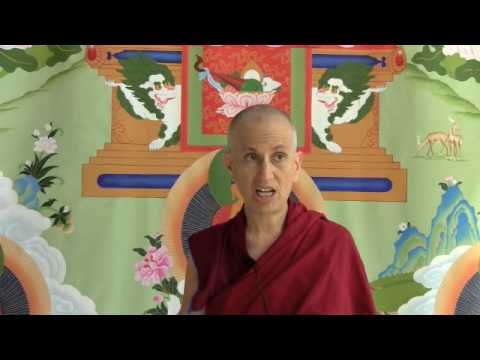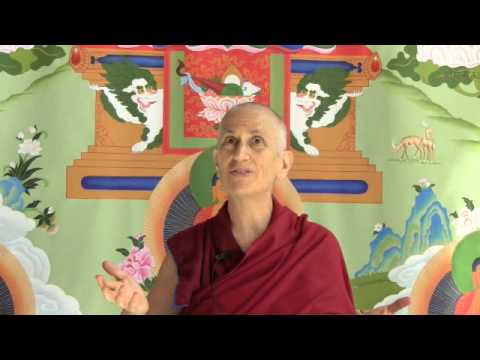How to see the guru
Stages of the Path #57: Refuge Ngöndro Part 6
Part of a series of short talks on the preliminary practice (ngöndro) of taking refuge.
- The ngöndro of the preliminary practices prior to tantric retreat
- The ultimate guru, the omniscient mind of all the Buddhas
- Our spiritual mentors are the ones guiding us on the path
Stages of the Path 57: Guru refuge (download)
We concluded the visualization for the ngöndro and I wanted to talk a little bit about the ngöndro of the preliminary practices prior to tantric retreat. They’re done to accumulate merit and to purify the mind. We’ve been talking about the one of taking refuge. When we say:
Namo Gurubhya, Namo Buddhaya, Namo Dharmaya, Nama Sanghaya.
I take refuge in the Guru, I take refuge in the Buddha, I take refuge in the Dharma, I take refuge in the Sangha.
We talked before about how the guru was not a fourth refuge but we see when we take refuge in the guru it’s meant as the ultimate guru, the omniscient mind of all the Buddhas that embody all of the Buddha, Dharma, and Sangha. When we do the part of taking refuge in the guru and we say over and over again, Namo Gurubhya, Namo Gurubhya, Namo Gurubhya and so on, then you focus on the Buddha, who is the central figure, which is the embodiment of all of your gurus. Then, the four groups of gurus sitting around: in front, your direct teachers, on the Buddha’s right, Maitreya and the Vast Lineage; on the Buddha’s left, Mañjuśrī and the Profound Lineage; in back, Vajradhāra and the Lineage of the Profound Practice.
As you say Namo Gurubhya, at first you imagine white light coming from all of these gurus into you, and that white light purifies all your negative karma, especially any negative karma you have created in relationship with your spiritual mentors.
This includes disregarding their instructions and their advice, which we do pretty consistently; endangering their lives, which hopefully we don’t do too often; disturbing their minds—I’ll let you evaluate if you do that; criticizing them—maybe we better skip that one; misappropriating their belongings; getting angry at them—oh, you didn’t hear that one; speaking harshly to them. In short, we purify all the negativities that we’ve created with our spiritual mentors.
The idea here is that our spiritual mentors are the ones who are explaining the teachings to us and who are guiding us on the path. If we get angry at them, or if we criticize them, if we damage them, if we toss them out the window because we’re fed up, if we ignore the instructions, if we make things difficult for them—what we’re doing is basically making things difficult for ourselves. Here the person is trying to help us on the path and we’re going, “Stay away from me; don’t tell me what to do! Don’t give me advice. Don’t do this. You can talk to me if you’re going to say nice, ego-pleasing things but aside from that, I don’t want to hear ‘boo!’” This is what our egos say, isn’t it? This gets reflected in our actions a good number of times.
It’s something to really pay attention to because it’s something that damages us in our practice. We’ve done these kinds of faults and created this kind of obstacle for ourselves and so we purify it by imagining the white light coming into us and to all the sentient beings around us.
You can also reflect at that time if you’ve seen other people do misdeeds towards their spiritual mentors—and purify them. When you see other people do these kinds of misdeeds, don’t get proud, like “Oh, I haven’t acted like that towards my teacher.” Because who knows what we’ve done in our previous lives that in the past may have caused us not to meet qualified teachers for eons, and we don’t know if we have that kind of karma remaining in our mindstream. If we see others do these kinds of negative actions, just say to ourselves, “I could have done that kind of thing in my previous lives; those seeds may still be in my mindstream. When I say Namo Gurubhya,I am going to imagine that all of those misdeeds have been purified as well.”
We focus a while on the purifying, and then we imagine yellow light or golden light coming from all of the gurus and this imbues us—it carries with us—all their realizations. The good qualities of all of our gurus, the things we admire in them, the qualities of the Buddhas, we imagine that this all flows into us and all the sentient beings around us as we recite Namo Gurubhya and imagine the golden light coming.
Venerable Thubten Chodron
Venerable Chodron emphasizes the practical application of Buddha’s teachings in our daily lives and is especially skilled at explaining them in ways easily understood and practiced by Westerners. She is well known for her warm, humorous, and lucid teachings. She was ordained as a Buddhist nun in 1977 by Kyabje Ling Rinpoche in Dharamsala, India, and in 1986 she received bhikshuni (full) ordination in Taiwan. Read her full bio.


